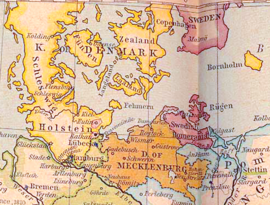First War against Napoleon
| The Pomeranian War | |||||||
|---|---|---|---|---|---|---|---|
| Part of the Napoleonic Wars | |||||||
 Swedish Pomerania (centre-right) in 1812 |
|||||||
|
|||||||
| Belligerents | |||||||
|
|
|
||||||
| Commanders and leaders | |||||||
|
|
|
||||||
| Strength | |||||||
| 13,000 men (in 1805) 40,000 men (in 1810) |
12,125 men (in 1805) 27,000 men (in 1810) |
||||||
| [a] Gustav IV Adolf was deposed by a coup d'etat on March 9, 1809, and Charles XIII was appointed king in his place. | |||||||
French victory, Treaty of Paris
The Franco-Swedish War or Pomeranian War was the first involvement by Sweden in the Napoleonic Wars. The country joined the Third Coalition in an effort to defeat France under Napoleon Bonaparte.
In 1803 Britain had declared war on France, at this time Sweden had remained neutral together with the Nordic countries Denmark–Norway and Prussia. But after the execution of Louis-Antoine-Henri de Bourbon-Condé in 1804, the Swedish government broke all diplomatic ties with France and concluded a convention allowing the British to use Swedish Pomerania as a military base against France, in exchange for payments. Russia also promised Sweden that 40,000 men would come to the aid of the country if it was threatened by French forces. So on 9 August 1805 Sweden joined the Third Coalition and declared war on France on 31 October.
In the beginning of November 1805, a combined British, Russian and Swedish force of about 12,000 men were sent from Swedish Pomerania to liberate French-held Hanover. The offensive against Hanover was repeatedly delayed because of Prussia's partial reluctance that the Swedes and the Russians moved troops through Prussian territory. However, in December 1805, after the battle of Austerlitz, the British and the Russian forces started to evacuate Hanover, leaving only a small Swedish force alone to face the French. In April 1806, the Swedes were also forced to retreat back to Swedish Pomerania after an agreement had been concluded between Prussia and France.
But during the summer of 1806 Prussia formed the Fourth Coalition against France, which gave Sweden the right to occupy Lauenburg. But during the autumn, the French forces advanced rapidly and soon much of the western German regions were occupied, this forced the Swedish troops on a retreat towards Lübeck. The plan was that the troops from there could take the sea route to Stralsund in order to avoid the advancing French forces. The Swedes were still caught by the French on the 6 November while they loaded their ships at Lübeck, and following the battle of Lübeck about 1,000 Swedish soldiers had to surrender to the numerically superior French forces.
...
Wikipedia
